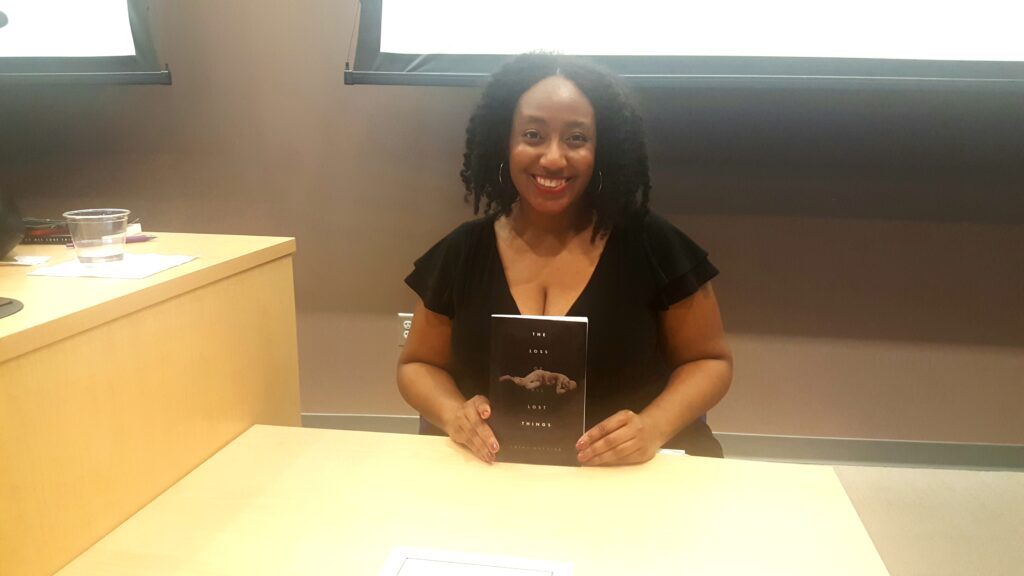UWG’s Blackwell Prize writer Amina Gautier shared harrowing short stories of loss with the Newnan and Carrollton communities over her two week visit.
Gautier is an Associate Professor of English at the University of Miami and has picked up steam as a renowned short story author with over 140 stories and three collections.
In 2018, Gautier became the first African American woman to achieve the PEN/Malamud Award founded in 1988. She also received the Chicago Public Library Foundation’s 21st Century Award prior to the PEN/Malamud award.
All three of Gautier’s published short story collections have also achieved many awards including the Elixir Press Award in Fiction, the Phillis Wheatley Award, the Hurston/Wright Award and many other highly distinguished awards.
“Ten years before I published my first book, I spent 2000 to 2010 just writing short stories and creating a portfolio,” says Gautier. “Until I had a whole portfolio and then spent ten years submitting those stories to the different literary journals and contests that I respected. Just building up a name for myself.”
The Blackwell Prize in Writing is chosen from nominated individuals and given to a writer each year who is recognized for their printed writing and ability to engage an audience on the public stage.
This year the collection distributed was “The Loss of All Lost Things”, stories which circle themes of loss in varying capacities and perspectives.
“I get most of my ideas from life,” says Gautier. “From images that I see or think about or characters that I come up with. Most of the time, I will do what I call ‘Macgyvering’ where I take different things that are on my mind or different things that I’ve seen. And just sit there until I create a story out of them.”
In Gautier’s talk at Newnan Campus on Mar. 15, Gautier explained that she has never had writer’s block because even though she pauses work for a story to think about it, she will switch gears to work on another simultaneously. This is a style that is not universal for all writers but that has worked well for Gautier.
“The first advice for anyone who wants to write is read, read, read, read, read,” says Gautier. “I know people get tired of people saying that, but read, read, read, read, read.”
Gautier also suggests that aspiring and even seasoned writers be able to know the difference between editing and revising. Among writers, editing usually connotes cutting and tightening a work whereas revising encourages expanding and adding.
“[When editing] you don’t think about adding, you only think about subtracting,” says Gautier. “And for a third piece [of advice]: Don’t forget that your characters are based on real human beings,” says Gautier. “Obviously they aren’t real people. But sometimes writers forget they are based on people and tend to treat them as a means to an end rather than giving them humanity and complexity.”
Gautier also focuses heavily on the human lives of her characters as shown in her stories, in which she expresses that she only has two happy stories out of her 140.
“One more piece of advice,” says Gautier. “Keep in mind that literature and film are two different disciplines. What works on the screen may not necessarily work on the page. It means that when you do have characters move around in fiction, their movement has to count. If you’re going to describe the minutiae— the little movements that a character is doing— then it’s going to have to mean something or imply something about their emotional or psychological state.”
With the recognition comes a $10,000 honorarium and a residence in Gray Cottage in Newnan, GA where the writer is invited to stay for two weeks. In that time, they balance their vacation with several presentations at organized local events in the Newnan and Carrollton areas including community, high school and university events.
“This [nomination] makes the award even more prestigious,” says Gautier. “It’s really nice to win [through being chosen] because it means that people know your work or think highly enough of it to recommend or nominate you.”
You may also like
-
UWG’s Ingram Library Hosts Pop-Up Study Spot to Help Students Prepare for Finals Week
-
UWG Offers Mental Health Support And Academic Services To Maintain Student Success During Finals Week
-
UWG Alumnus Shares His Experience Exploring the Underground Flood Channels of Las Vegas
-
Georgia Students Simulate the Struggles of Dementia
-
UWG PR Students Score a Georgia Power Tour at Atlanta Corporate Office
